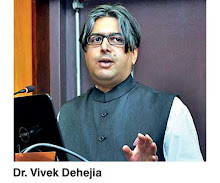Monday, January 24, 2011
Monday, January 17, 2011
Friday, January 14, 2011
Event announcement!
Friday, January 7, 2011
Wednesday, January 5, 2011
Everyday Economics: Why agree on a fixed taxi fare when they have meters?
Having spent this past week in Bangalore, India, I've been getting around by auto-rickshaw -- you've seen them, right? The three-wheeled contraptions that are ubiquitous in Asia as a convenient mode of transport and substitute for a taxi. Small and nimble, they work their way through chaotic traffic and get you to your destination faster than your Porsche (if you have one -- I don't), which would be mired in traffic from the moment you left home.
Now, the Bangalore variety of these autos have meters, snazzy new ones in fact. Fact is, most drivers and most passengers prefer to negotiate a fare in advance rather than go by the meter. I asked myself why. Several possibilities presented themselves. Let me know what you think and if there are others you could add.
1. Eliminate nuisance and minimize transaction costs. At flag drop, the meter starts at 17 rupees. A short ride will cost you 17, or 21, if it the meter has "clicked" once. Most people don't carry small change -- in fact coins are being phased out in India, and even a one rupee coin is hard to come by. So for short fares you generally just settle on twenty rupees.
2. For longer fares, I can think of a couple of explanations. The first is that, assuming a well-informed passenger as well as driver, you know roughly what the fare will come to for a trip you take often. For instance, from where I'm staying to the snazzy new Mantri Mall (I go there purely for sociological research, if you're interested), I know from past experience taking metered rides that it costs anywhere from ninety to 110 rupees. So the driver and I normally settle on a nice round figure in between, one hundred. This eliminates the driver's incentive to, say, take a circuitous route, or deliberately busy streets, to try to ring up the metered fare.
3. Another possibility: For longer fares, agreeing on a fare in advance eliminates uncertainty which is bad for both driver and passenger. For instance, a fare which on average is a hundred rupees, might be ninety if traffic is unusually light or 110 if unusually heavy. By agreeing on a hundred in advance, assuming both driver and passenger are risk-averse, both come out ahead.
So why would anyone go by the meter? If you don't know your way around the city, you might prefer a meter, but then you run the risk of being fleeced by the driver. Of course, he could also fleece you by asking for an excessively high fixed fare in advance. Not sure about this one. Any thoughts?
Vivek H. Dehejia, economist and writer, comments on the politics of economics in India. You may follow him on Twitter @vdehejia.
